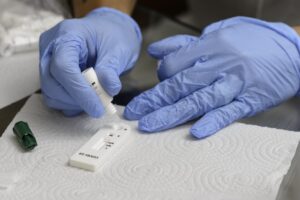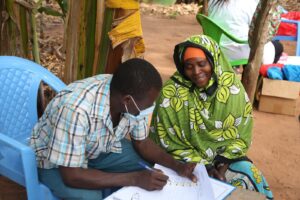
WHO: In vitro diagnostics for COVID-19
Safe and effective in vitro diagnostics (IVDs) are a critical component of
Ensuring that the developed in-vitro diagnostic (IVDs) tools and technologies emerging from the R&D phase are safe and accurate is critical to ensuring their effective use to achieve public health objectives. Consumers, whether patients or health professionals are not in a position to assess the quality and safety or set policies for the appropriate use of diagnostic tools and technologies. Instead, regulatory authorities and recognized agencies are responsible for this oversight.
During the initial stages of the pandemic, there was a vacuum in knowledge as SARS-CoV-2 was a new pathogen with unknown pathogenesis (development of disease) and risk. Additionally, access to specimens was limited, making it difficult for IVD manufacturers to develop and validate tests according to established principles. As a result, markets were flooded with tests (e.g., SARS-CoV-2 molecular and antigen-detection rapid tests – AgRDTs) of varying quality. Without sufficient capacity and capability, delays in access to SARS-CoV-2 IVDs can occur and, on a larger scale, can threaten global public health security. Many countries felt this challenge acutely, particularly those in low- and middle-income settings with a weaker capacity to provide regulatory oversight and appropriate assessment of products.
Furthermore, there was an urgent need for testing guidance and policy to inform use cases for testing, prioritization for populations and settings, and considerations for implementation. Moreover, given the dynamic nature of SARS-CoV-2 transmission and varying resource availability, it is critical that these policies and strategies remain agile and adaptive.
Since 2014, WHO has had an Emergency Use procedure in place which can be activated in response to a Public Health Emergency of International Concern (PHEIC). To quickly respond to the rapidly evolving environment, WHO initiated the Emergency Use Listing (EUL) procedure for IVDs to detect SARS-CoV-2 during the very early stages of the COVID-19 pandemic. WHO’s EUL procedure is a risk-based approach to assess and list commercially available in-vitro diagnostics, unlicensed vaccines and therapeutics with the aim to speed up the availability of these products for emergency use. In addition, WHO and other national, regional and local public health agencies also developed technical specification guidance, testing guidelines, guidiance on specimen collection and transport, as well as other critical normative products to promote the safe, appropriate development, production, regulation, implementation and use of SARS-CoV-2 tests.
With the support of partners, the following key activities were prioritized to support quality assurance and policy efforts:
Investments in quality assurance activities and policies for COVID-19 IVD tools and technologies enabled countries to access and usage of safe and effective products for the diagnosis and screening of SARS-CoV-2. Notable regulation achievements are highlighted below. To learn more about quality assurance and policy achievements and work, refer to the key learnings and resource section below.
expressions of interest for COVID-19 EUL received by WHO
antigen RDTs approved by WHO for EUL
molecular tests approved by WHO for EUL
member states have access to WHO COVID-19 testing guidelines

Safe and effective in vitro diagnostics (IVDs) are a critical component of

In March 2022, the World Health Organization published its first guide to
© All Rights Reserved 2023
The ACT-A Dx Knowledge Hub is hosted by FIND on behalf of the ACT-Accelerator Diagnostics Pillar partnership.